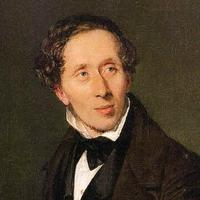The shoes of fortune, II. What Happened to the Councillor, part 3
He looked for the house, but it had vanished.
"It is really dreadful," groaned he with increasing anxiety; "I cannot recognise East Street again; there is not a single decent shop from one end to the other! Nothing but wretched huts can I see anywhere; just as if I were at Ringstead. Oh! I am ill! I can scarcely bear myself any longer. Where the deuce can the house be? It must be here on this very spot; yet there is not the slightest idea of resemblance, to such a degree has everything changed this night! At all events here are some people up and stirring. Oh! oh! I am certainly very ill." He now hit upon a half-open door, through a chink of which a faint light shone. It was a sort of hostelry of those times; a kind of public-house. The room had some resemblance to the clay-floored halls in Holstein; a pretty numerous company, consisting of seamen, Copenhagen burghers, and a few scholars, sat here in deep converse over their pewter cans, and gave little heed to the person who entered.
"By your leave!" said the Councillor to the Hostess, who came bustling towards him. "I've felt so queer all of a sudden; would you have the goodness to send for a hackney-coach to take me to Christianshafen?" The woman examined him with eyes of astonishment, and shook her head; she then addressed him in German. The Councillor thought she did not understand Danish, and therefore repeated his wish in German. This, in connection with his costume, strengthened the good woman in the belief that he was a foreigner. That he was ill, she comprehended directly; so she brought him a pitcher of water, which tasted certainly pretty strong of the sea, although it had been fetched from the well.
The Councillor supported his head on his hand, drew a long breath, and thought over all the wondrous things he saw around him.
"Is this the Daily News of this evening?" he asked mechanically, as he saw the Hostess push aside a large sheet of paper.
The meaning of this councillorship query remained, of course, a riddle to her, yet she handed him the paper without replying. It was a coarse wood-cut, representing a splendid meteor "as seen in the town of Cologne," which was to be read below in bright letters. "That is very old!" said the Councillor, whom this piece of antiquity began to make considerably more cheerful. "Pray how did you come into possession of this rare print? It is extremely interesting, although the whole is a mere fable. Such meteorous appearances are to be explained in this way--that they are the reflections of the Aurora Borealis, and it is highly probable they are caused principally by electricity."

